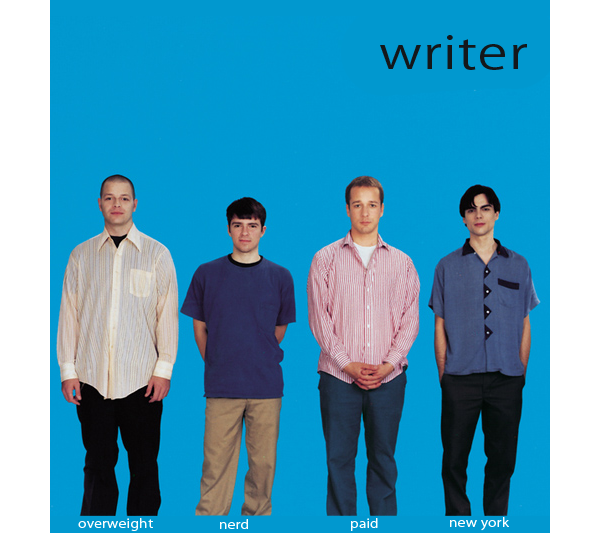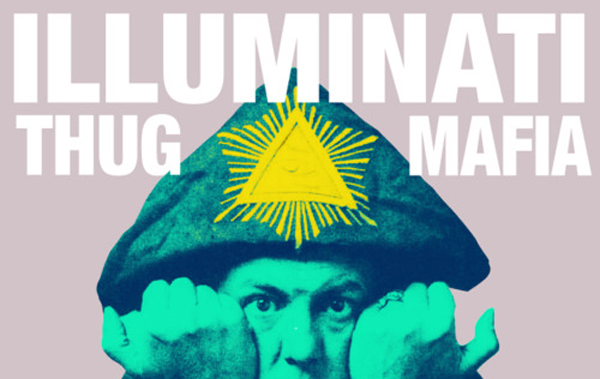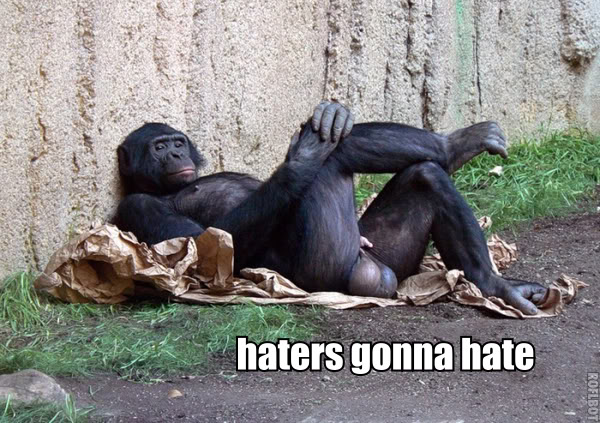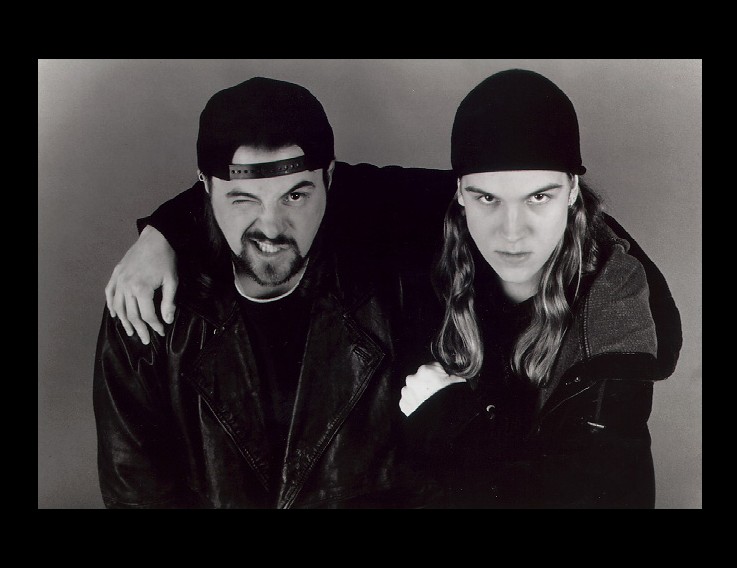What is Experimental Literature? {Five Questions: Susan Steinberg}
Susan Steinberg is the author of the short story collections, Hydroplane (FC2) and The End of Free Love (FC2). Her stories have appeared in McSweeney’s, Conjunctions, The Gettysburg Review, American Short Fiction, Boulevard, The Massachusetts Review, Quarterly West, Denver Quarterly, LIT, Columbia, and elsewhere. She has held residencies at The MacDowell Colony, The Vermont Studio Center, The Wurlitzer Foundation, the Blue Mountain Center, and Yaddo and was recently Scholar-in-Residence in the Department of Performance Studies at NYU. She received a BFA in Painting from the Maryland Institute College of Art and an MFA in English from The University of Massachusetts, Amherst.
Writer archetypes based on Weezer album cover

Overweight
The overweight writer is often the “stay at home” dad, an economically emasculated man whose wife’s once romantic/idealistic patience declines in direct proportion to the angle of his erection. He wakes up at 10:17am, makes himself two eggs and some sausages, and sips OJ while rummaging through last Sunday’s New York Times for culturally significant “ideas”; this lasts for 50 minutes until he’s on the PS2 again, ignoring the litter- and in-box hosting fresh poop and manuscript rejections, respectively. 3.5 years and 35 lbs. later, he’s looking for that perfect parking spot right next to Barnes & Noble because he can’t stand to walk the 40 yards for that once read DeLillo novel he swears will re-influence him. The XL shirt he got at Nordstrom rack does well to hide the love handles/beer belly, but no made in Singapore linen’s gonna hide that vacancy sign on his receding hairline.
On Criticism
I’ve been spending a lot of time lately thinking about the position of criticism. At least, specifically in the online sphere. Clearly, the culture of criticism is something that helps perpetuate discussion about this stuff we like, which is always a good thing. Namely, this stuff we like, here at HTMLGIANT, is literature. Criticism can be great because it can carry on a conversation about a piece of work which helps to maintain the lifespan of the work. This is stuff that needs to happen– literature should not be read and forgotten, it should live on in other words I think.
The first public writing I ever did on the internet was film reviews. I started doing it because I was watching a lot of movies that had me really fucking excited, but nobody else on the internet was writing about them. Or, if they were mentioned at all, it was either in dismissive brevity or a simple exclamatory remark like “THIS SHIT IS DOPE!” Empty hyperbole is fine, and sometimes that’s all you have the energy to say, but I didn’t want to leave the space of these films. I wanted to engage with them and keep them going, because I knew they were powerful and needed some more recognition.
The first problem I ran into would be when I would watch something & end up not liking it at all. At the time, when I was basically just “developing content” in addition to gaining experience with what it was that I was doing, anything I had in my mind that I was going to review before watching it, I was stubborn enough to actually write about. If I found a film mediocre, the writing became a chore. If I hated a film, it was easy to spit vitriol, but I knew I wasn’t engaging with the film & that my commentary was useless. So, to put it simply, I stopped reviewing anything I didn’t like.
Story + Geography = Memory (via Andi Bell’s Link Method)
httpv://www.youtube.com/watch?v=X-xl7_hdWZo&feature=player_embedded
httpv://www.youtube.com/watch?v=9NROegsMqNc&feature=related
†Illuminati∞Thug∆Mafia‡

So tell me about the name of the new record, Illuminati Thug Mafia?
It’s kinda like the unseen terrible, you know what I mean. All these things have a negative mythology to them. At the same time these organizations, you know that none of us completely know, have their own culture individually. You hear Illuminati, you hear thug, you hear mafia you kind of dismissed it instantly, or at least a degree where you prepare what the the fuck you’re gonna hear. You already prepare yourself to already not believe it, take it with a grain of salt. In a way combine all three of those and it kind of like it’s some real super power, the ultimate fucking ridiculousness.
I went to the Getty recently, and saw an exhibit of illuminated manuscripts. READ MORE >
Fear and Bravery of Pseudonyms
 At the AWP bookfair, Michael Kimball showed me a copy of this pretty little book, Normally Special, by a writer called xTx. I asked Michael something like, “what’s the deal with the name?” He said she was a writer who publishes stuff under her real name, but also uses this pseudonym when she writes stuff she doesn’t want her family to read or kids to read. I asked Michael if anyone knew who the writer was and he said maybe Roxane Gay, since she had published the book, but maybe nobody else knew. “I don’t think I’d want to read any of that other stuff anyway,” he said.
At the AWP bookfair, Michael Kimball showed me a copy of this pretty little book, Normally Special, by a writer called xTx. I asked Michael something like, “what’s the deal with the name?” He said she was a writer who publishes stuff under her real name, but also uses this pseudonym when she writes stuff she doesn’t want her family to read or kids to read. I asked Michael if anyone knew who the writer was and he said maybe Roxane Gay, since she had published the book, but maybe nobody else knew. “I don’t think I’d want to read any of that other stuff anyway,” he said.
Tiny back story: When I was twelve or thirteen I learned how to code HTML so I could build websites. It was 1999 and compared to now, the internet was pretty barren place. I built a website for my church’s Youth Group because I was really into that kind of thing, a fan site for Sheryl Crow because I was really into her first two albums, and I published my own stories on a Geocities page because I wanted someone to read things I’d written, just so long as I didn’t have to answer to it.
Another story: A few years ago, a mentor of mine from New Orleans came to visit New York and we had coffee. He was the one who got me to move to New York in the first place, the one who told me to go to grad school, the one who made me excited about creative nonfiction. He published a very autobiographical novel about his childhood in Louisiana and told me his mother had a hard time with the way the mother character was represented in the book. Over our coffee, he asked me what I was working on and I said, somewhat embarrassed, that I was working on a memoir. He asked me if my family knew and I said not really and he said, “Don’t talk to them about it until it’s done. They’ll change your memories, they’ll change your story without even trying.” (A loose quote, of course, but you get the picture.) Most importantly, he told me, You can’t write a good story if you’re worried about what someone is going to think about it, if you’re worried about hurting someone’s feelings. READ MORE >
Michael Kimball’s Us [Tyrant Books, 2011]
Michael Kimball’s truly crushing second novel, released in the UK in 2005, will finally see its U.S. release on May 10 of this year from Tyrant Books. Preorders have begun. Below, a trailer for the book based on a single sentence, created by Luca Dipierro.
Gordon Lish Knopf Bibliography [1977-1995]
Gordon Lish began working as an editor at Alfred A. Knopf in 1977 after leaving his role as editor at Esquire Magazine. He continued work with Knopf for 18 years until parting ways in 1995, having assembled what is arguably one of the greatest editorial runs in publishing.
The listing below is a catalog of the titles and authors Lish published during this time. This is surely not a complete list, but is at least a decent stab at the continuum; comments are welcome with any suggestions as to the extant.
Most of these titles, if not having been reprinted by other houses, are available used on Amazon or in places like Abe Books.
1976 Don DeLillo, Ratner’s Star
Cynthia Ozick, Bloodshed and Three Novellas
1977 Don DeLillo, The Players
1978 Stanley Crawford, Some Instructions to my Wife…
Don DeLillo, Running Dog
Barry Hannah, Airships
1979 Mary Robison, Days
An open letter to Kevin Smith (aka Silent Bob) about silence and writing-as-shitting
Dear Kevin Smith,
You have a fucking radio show? That’s kind of hilarious because you were always the silent one. You were Silent Bob. You went from being pure body to pure voice. Why’d you do it, man? There was something philosophical about your silence, they way you were so expressive without saying anything. We all liked to imagine what you were thinking, how you were perceiving everything that was going on around you. There was a profound quality to your sparse interjections (because you never spoke, because of the scarcity of your words). The law of economics says that when demand exceeds supply, value increases. Maybe I should shut up. Maybe I should retreat into silence like you once did. Maybe then—only then—will people give a shit about any of this. Any of these words.
When you did speak, we felt lucky to be graced by your wise words. Because you never spoke, we felt like you were enlightened, like you were beyond language, like language was something the petty people did, and you did not need it. You were above all that, the way spiritual gurus are above food, the way they no longer need to satiate those earthly desires. You didn’t need to feed the part of the body that longs for recognition. You were a watcher, an observer. Everyone around you was always blabbering on and on, but you didn’t feel the need to fill up space in the same way. You know, most people feel anxious about silence. It’s the hardest thing, to live in silence. You can’t just “be” next to someone. It makes you totally nuts to feel like you don’t know what they’re thinking. Maybe their silence means hatred. Maybe I’m fucking boring. So we talk on and on because we are afraid, because we need to know where the other person is at, because silence can mean anything and we need our interactions to be anchored in certainty.
It is Thursday Morning: Go Right Ahead
Do you have a respectable suit you could trust me with?
Don’t be too harsh to these poems until they’re typed.
I am sorry Yeats is dead.
A dog among the fairies.
I cycled home in the dark without a lamp of any kind.
Fourteen pints is par.
I went on all over the States, ranting poems to enthusiastic audiences that, the week before, had been equally enthusiastic about lectures on Railway Development or the Modern Turkish Essay.
Our discreditable secret is that we don’t know anything at all.
Then hang a ram rose over the rags.
I am not a country man. I stand for the evening pub.
WOWELS.
Or a lotion of invisibility.
Somebody’s boring me. I think it’s me.




